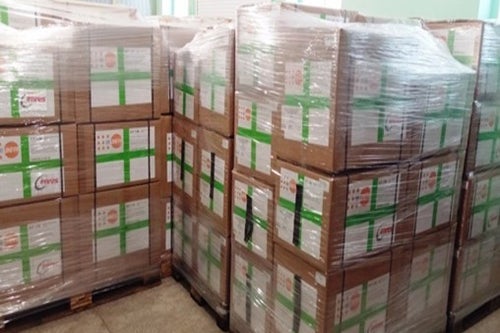News
COVID-19 affects Ukraine health systems already compromised by conflict
- 06 April 2020
News
KYIV, Ukraine – As the number of COVID-19 cases nears 1,500 in Ukraine, UNFPA is urgently distributing medical kits containing disinfectant and personal protective equipment (PPE).
Bohdan Pidverbetskyi, a UNFPA reproductive health officer working in the country, emphasizes the particular importance of one of the kits – known as medical kit 11 – for staff working with infected persons. “It contains a sterile medical costume, goggles and other protective supplies used during surgery on people living with HIV,” he said. “There are also antiseptic chlorhexidine solution and intravenous fluids.”
One facility to receive these critical supplies is the Pokrovsk Perinatal Centre, located in Krasnohorivka, on the front lines of the years-long armed conflict in eastern Ukraine. The city still experiences occasional shelling.
The kits offer a measure of peace of mind to staff already working under stressful conditions, says Ivan Tsyganok, who heads the centre. “What is the most important is people see that it works,” he said.
The Pokrovsk Perinatal Centre provides services for one third of the region of Donetsk, including those with serious conditions and those from non-Government-controlled areas.

Dr. Tsyganok remembers one patient in particular: Maria* arrived at the centre two years ago after her car was crushed in an accident in Makiivka, a city in non-Government-controlled territory. She was pregnant, and her pelvis was shattered, making natural childbirth impossible.
“They came to us totally desperate. Prenatal care of such a pregnancy requires a lot of medicines, surgical tools and postoperative remedies,” Dr. Tsyganok recalled. Maria was able to receive a successful Cesarean section; she and her baby were both healthy.
These services must continue, even as the COVID-19 pandemic takes hold, experts say.
Yet the centre is perennially underfunded. In 2018, it received only 7800 UAH (about $270) from the city budget for the procurement of medicine. The rest of the centre’s needs have been met with humanitarian assistance from UNFPA, including funding from the United Nations Central Emergency Response Fund.
UNFPA’s support includes the regular delivery of medical kits. “Each kit contains all required tools, medicines, and medical equipment for providing obstetric and gynaecological care. There are kits for post-rape treatment, post-exposure prophylaxis, contraception, natural and complicated childbirth, miscarriage treatment, treatment of sexually transmitted infections and complications arising from abortions,” said Mr. Pidverbetskyi. “One kit allows to providers to perform 105 surgeries, and it weighs nearly 1100 kilos,” he added.
Today, the medical kits containing PPE are more critical than ever.
So far, there have been about 9 confirmed cases of COVID-19 in Donetsk Region, putting health personnel on high alert.
The region’s health system is already overstretched. According to health department data, about 1,500 medical personnel exited the area due to the conflict.
To meet the community’s reproductive health needs, UNFPA had been deploying mobile medical teams. These teams – comprised of a gynaecologist, family doctor, nurse and social worker – would travel long distances to reach people who would otherwise go without care.
“For sure, such services were popular,” said Mr. Pidverbetsky. Between May and December of 2019, more than 19,000 people received obstetric and gynaecological exams through the programme.
The project is now coming to a close. UNFPA hopes to resume these mobile services soon, but movement restrictions have been adopted to stop the spread of the coronavirus.
“Following the Ministry of Health decree on COVID-19 prevention measures, health facilities have reduced their service provision to a minimum,” said Mr. Pidverbetsky. “Only emergency cases are allowed, no routine gynaecological examination or intervention and counselling, except over the phone. We have restrictions on public transport and all of the inter-cities routes now.”
UNFPA is working towards scaling up delivery of critical supplies, including PPE, in the coming weeks.
*Name changed to for privacy and protection